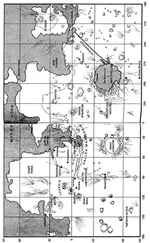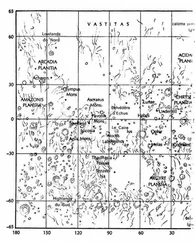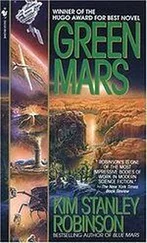John Boone rip-ripped his way to the computer terminals at the fore end of the room, where Arkady and Alex were monitoring the ship. He punched in a command, and the exterior radiation data were suddenly displayed on the room’s biggest screen. “Let’s see how much is hitting the ship,” he said brightly.
Groans. “Must we?” exclaimed Ursula.
“We might as well know,” John said. “And I want to see how well this shelter works. The one on the Rust Eagle was about as strong as the bib you wear at the dentist’s.”
Maya smiled. It was a reminder, rare from John, that he had been exposed to much more radiation than any of the rest of them— about 160 rem over the course of his life, as he explained now in response to someone’s question. On Earth one caught a fifth of a roentgen equivalent man per year, and orbiting Earth, still inside the protection of the Earth’s magnetosphere, one took around thirty-five per year. So John had taken a lot of heat, and somehow that gave him the right, now, to screen the exterior data if he wanted to.
Those who were interested— about sixty people— clumped behind him to watch the screen. The rest relocated at the far end of the tank with the people worrying about motion sickness, a group that definitely didn’t want to know how much radiation they were taking. Just the thought was enough to send some of them into the heads.
Then the full force of the flare struck. The exterior radiation count shifted to well above the solar wind’s usual level, and then soared in a sudden rush. An indrawn hiss came from several observers at once, and there were some shocked exclamations.
“But look how much the shelter is stopping,” John said, checking the dosimeter pinned to his shirt. “I’m still at only point three rem!”
That was several lifetimes of dentists’ X-rays, to be sure, but the radiation outside the storm shelter was already 70 rem, well on its way to a lethal dose, so they were getting off lightly. Still, the amount flying through the rest of the ship! Billions of particles were penetrating the ship and colliding with the atoms of water and metal they were huddled behind; hundreds of millions were flying between these atoms and then through the atoms of their bodies, touching nothing, as if they were no more than ghosts. Still, thousands were striking atoms of flesh and bone. Most of those collisions were harmless— but in all those thousands, there were in all probability one or two (or three?) in which a chromosome strand was taking a hit, and kinking in the wrong way: and there it was. Tumor initiation, begun with just that typo in the book of the self. And years later, unless the victim’s DNA luckily repaired itself, the tumor promotion that was a more or less unavoidable part of living would have its effect, and there would appear a bloom of Something Else inside: cancer. Leukemia, most likely; and, most likely, death.
So it was hard not to regard the figures unhappily. 1.4658 rem, 1.7861, 1.9004. “Like an odometer,” Boone said calmly as he looked at his dosimeter. He was gripping a rail with both hands and pulling himself back and forth, as if doing isometric exercises. Frank saw it and said, “John, what the hell are you doing?”
“Dodging,” John said. He smiled at Frank’s frown. “You know— moving target!”
People laughed at him. With the extent of the danger precisely charted on screens and graphs, they were beginning to feel less helpless. This was illogical, but naming was the power that made every human a scientist of sorts. And these were scientists by profession, with many astronauts among them as well, trained to accept the possibility of such a storm. All those mental habits began channeling their thoughts, and the shock of the event receded a bit. They were coming to terms with it.
Arkady went to a terminal and called up Beethoven’s Pastoral Symphony , picking it up in the third movement, when the village dance is disrupted by storm. He turned up the volume, and they floated together in the long half-cylinder, listening to the intensity of Beethoven’s fierce tempest, which suddenly seemed to enunciate perfectly the lashings of the silent wind pouring through them. It would sound just like that! Strings and woodwinds shrieking in wild gusts, out of control and yet beautifully melodic at the same time— a shiver ran down Maya’s spine. She had never listened to the old warhorse this closely before, and she looked with admiration (and a bit of fear) at Arkady, who was beaming ecstatically at the effects of his inspired disk jockeying, and dancing like some red knot of fluff in the wind. When the symphony’s storm peaked, it was difficult to believe that the radiation count wasn’t rising; and when the musical storm abated, it seemed like theirs should be over too. Thunder muttered, the last gusts whistled through. The French horn sang its serene all-clear.
People began to talk about other things, discussing the various business of the day that had been so rudely interrupted, or taking the opportunity to talk about other things. After a half hour or more, one of those conversations got louder. Maya didn’t hear how it began, but suddenly Arkady said, very loudly and in English, “I don’t think we should pay any attention to plans made for us back on Earth!”
Other conversations went silent, and people turned to look at him. He had popped up and was floating under the rotating roof of the chamber, where he could survey them all and speak like some mad flying spirit.
“I think we should make new plans,” he said. “I think we should be making them now. Everything should be redesigned from the beginning, with our own thinking expressed. It should extend everywhere, even to the first shelters we build.”
“Why bother?” Maya asked, annoyed at his grandstanding. “They’re good designs.” It really was irritating; Arkady often took center stage, and people always looked at her as if she were somehow responsible for him, as if it were her job to keep him from pestering them.
“Buildings are the template of a society,” Arkady said.
“They’re rooms,” Sax Russell pointed out.
“But rooms imply the social organization inside them.” Arkady looked around, pulling people into the discussion with his gaze. “The arrangement of a building shows what the designer thinks should go on inside. We saw that at the beginning of the voyage, when Russians and Americans were segregated into Torus D and B. We were supposed to remain two entities, you see. It will be the same on Mars. Buildings express values, they have a sort of grammar, and rooms are the sentences. I don’t want people in Washington or Moscow saying how I should live my life, I’ve had enough of that.”
“What don’t you like about the design of the first shelters?” John asked, looking interested.
“They are rectangular,” Arkady said. This got a laugh, but he persevered: “Rectangular, the conventional shape! With work space separated from living quarters, as if work were not part of life. And the living quarters are taken up mostly by private rooms, with hierarchies expressed, in that leaders are assigned larger spaces.”
“Isn’t that just to facilitate their work?” Sax said.
“No. It isn’t really necessary. It’s a matter of prestige. A very conventional example of American business thinking, if I may say so.”
There was a groan, and Phyllis said, “Do we have to get political, Arkady?”
At the very mention of the word, the cloud of listeners ruptured. Mary Dunkel and a couple of others pushed out and headed for the other end of the room.
“Everything is political,” Arkady said at their backs. “Nothing more so than this voyage of ours. We are beginning a new society, how could it help but be political?”
Читать дальше
Конец ознакомительного отрывка
Купить книгу












